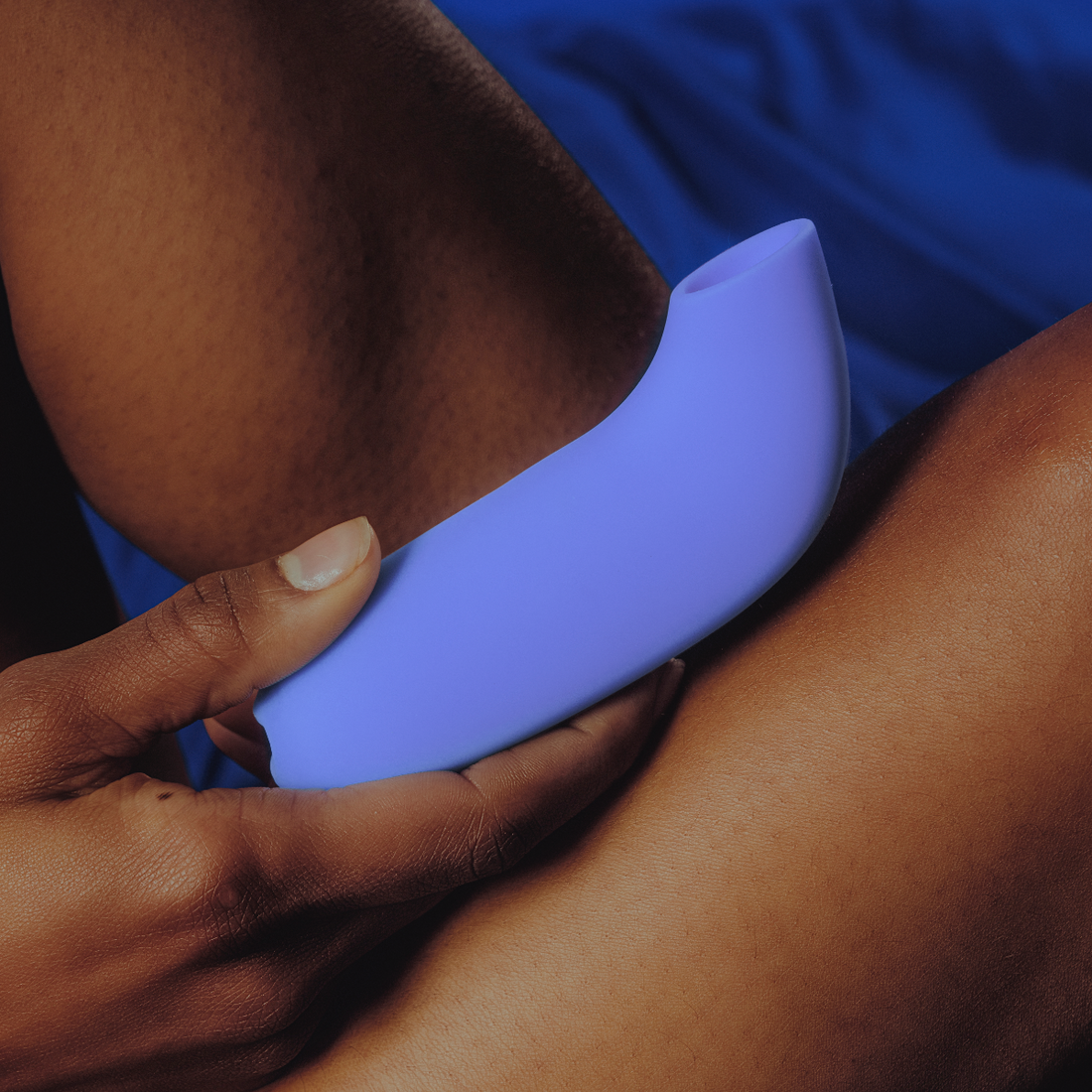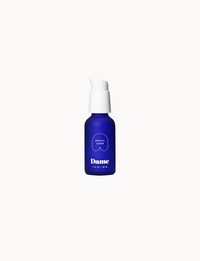Alexandra Fine, Credentialed Sexologist, M. Psych | Written by Dame
What Happens When You’re Climaxing? | Are there Health Benefits? | Are There Different Types? | Why Do Some People Have Trouble Climaxing? | Are Climax and Orgasm the Same Thing?
It’s a good thing we all know what “climaxing” means, because the Internet isn’t much help.
Online searches send you to “climax,” where you find things like this:
Synonym: conclusion, end, result, turning point. Similar words: anticlimax, climate, acclimate, acclimatise, climate change, acclimatization, climb, maxim. Meaning: ['klaɪmæks] n. 1. the highest point of anything conceived of as growing or developing or unfolding 2. the decisive moment in a novel or play 3. the moment of most intense pleasure in sexual intercourse
We’ve stopped there; the past participle, and links to the “word of the day” and a thesaurus, probably aren’t necessary to make our point.
Anyone who’s had even a few relatively-satisfying sexual experiences doesn’t need a dictionary or thesaurus. They know exactly what climaxing means. (Of course, you may have to reach into your memory banks to remember the experience, if the pandemic has stalled your sex life.)
Here’s what’s more interesting than the meaning: a look at what the body is actually doing when you have a mind-blowing orgasm. (Or at least a small one.)
Let’s dig into the subject, along with a look at the reasons why some people have trouble climaxing.
What Happens When You’re Climaxing?
Well, you may grunt, moan or scream – but that’s really not what we’re after here. We’re more concerned with what happens in your body and your brain to trigger those involuntary verbal reactions.
Let’s start with the more obvious stuff.
Your Body During a Climax
The story actually begins prior to orgasm, during what legendary sex researchers Masters and Johnson called the “excitement” and “plateau” stages of their four-stage sexual response cycle. (“Orgasm” and “resolution” are the stages that follow.) Some sexologists who followed up on Masters and Johnson’s research believe the original theory is too simplistic, but the actual physical and mental responses to sexual stimulation aren’t really in doubt.
Blood flow to the genitals increases through the excitement and plateau stages, and reaches its peak immediately before climaxing. That’s what causes the clitoris and vagina to swell (and the vaginal walls to darken), and the penis to become erect. Respiration (breathing rate), heartbeat and blood pressure levels, which all increase through the first two stages, also reach their highest point at the moment of sexual climax.
Muscles throughout the body tense up during the first two stages of the sexual response cycle, building physical and sexual tension. When climaxing, that tension is released through a series of intense and rhythmic muscle contractions. They’re most noticeable in the vagina, uterus and pelvic floor for vulva-havers, and at the base of the penis for penis-havers. For the latter group, that’s what causes the release of semen during ejaculation.
As the climax ends and the resolution phase begins, muscles contract, the body relaxes and a physical sense of warmth replaces built-up sexual tension. Emotional responses are also likely – and that’s largely due to interactions between the body and brain during climax and the moments before it.
Your Brain During a Climax
A common description of people with high libidos is that “they think with their [genitals], not their brain.”
That couldn’t be more incorrect, because the brain is intimately involved with the process of climaxing. Here’s some of what happens during the lead-up to orgasm and the climax itself.
- The part of the brain that’s responsible for reasoning and for recognizing fear, the lateral orbitofrontal cortex, becomes less active. That’s why people are less inhibited in the midst of sexual activity.
- Areas of the brain like the thalamus, motor areas and genital sensory cortex become more active. The motor areas and genital sensory cortex recognize ongoing physical actions and stimulation; the thalamus links that information with past memories or fantasies to enhance arousal and bring the body to orgasm.
- Meanwhile, several other areas of the brain (including the hypothalamus) are receiving neurological signals triggered by sexual activity and excitement, and calling for the release of hormones and neurotransmitters into the body.
Climaxing induces maximum levels of these chemical messengers, which include the “feel good hormone” dopamine and the “happy chemical” serotonin, as well as the “love hormone” oxytocin, which is largely responsible for the feeling of well-being that arrives after climax. (Oxytocin also plays a role in arousal.) The hormone prolactin is released during orgasm as well; some believe it may be responsible for the “refractory period” that prevents penis-havers from being able to plunge right back into sex.
- Blood flow increases substantially throughout the brain during sexual activity, and some believe that may work to support overall brain health – and by extension, sexual health and wellness.
That picture is certainly complicated. It shouldn’t be surprising, though, since the brain and body are inherently complicated. And thankfully, it happens unnoticed. Admit it: when you’re having sex and climaxing, you’re not overly concerned about what’s going on “under the hood” (except for the clitoral hood, of course).
Does Climaxing Provide Health Benefits?
We’ve already mentioned the possible brain benefits associated with sex and orgasms. The release of oxytocin we’ve discussed can help to relieve stress, and the feelings of intimacy it promotes can have a positive effect on relationships. Are there any other benefits?
Research tells us there are several. One study has shown that penis-havers who experience more climaxes have a lower risk of death from cardiovascular disease. Since those researchers didn’t interview vulva-havers, there’s no proof that orgasm provides the same benefit. But another study found that a higher frequency of vaginal intercourse improved heart health and was associated with a lower risk of death.
Frequent climaxing can also help lower the risk of prostate cancer in those with penises, and it can help pre-menopause vulva owners regulate their menstrual cycles and increase their chances of becoming pregnant. It may even boost the immune system, helping people fight off colds and the flu.
If you needed any excuses (other than sexual pleasure) to participate in your own sexual Olympics, there’s your motivation to get into training.
Are There Different Types of Climaxes?
No matter your sexual anatomy, we probably don’t have to tell you that orgasms from clitoral stimulation can be very different than g-spot orgasms. In research studies of the “female orgasm,” vulva-havers describe the former as intense, localized and physically satisfying, while they describe vaginal climaxing as deeper, a whole-body experience, and more satisfying psychologically. For some, it may difficult separating the two; research continually shows that about 20% of vulva owners are unable to climax solely from penetration.
There’s a similar difference for penis-havers, with penile orgasms generally more localized and prostate orgasms more intense and felt throughout the body.
What about climaxing from penetrative sex vs. climaxing from masturbation? Every person’s bodies and responses are different, of course, but it’s common for self-stimulation to produce more intense orgasms. That’s because people are more familiar with their own “hot spots” and favorite stimulation techniques than a partner may be. They may also be more likely to use sex toys to enhance the experience.
It’s not the same for everyone, needless to say. Some people, particularly vulva-havers in long-term relationships, find that the intimacy and familiarity associated with partnered sex takes the physical and emotional satisfaction of climaxing during penetrative sex to an entirely different level.
Why Do Some People Have Trouble Climaxing?
There are many possible explanations.
Some people are unable to reach orgasm because of health conditions like diabetes, kidney failure or vascular issues, neurological conditions like multiple sclerosis or Parkinson’s disease, hormone imbalances, or age. Vulva owners may also have gynecological issues which make sexual stimulation painful.
Mental health issues can often play a role in the failure to reach climax. Anxiety and stress, depression, deep-rooted guilt or shame about sex or self-image, the effects of previous sexual trauma, or relationship issues can all contribute to or cause an inability to orgasm.
There’s also a diagnosable mental health condition called “female sexual interest/arousal disorder” (a combination of previously recognized conditions “hyposexual sexual desire disorder” and sexual arousal disorder”). It can cause some with vulvas to have little interest in sex or to fail to respond to sexual stimulation – whether it’s during foreplay, masturbation or penetration. (FSIAD is treatable with medication.)
Some medications, notably anti-depressants, affect sexual function and the ability to reach climax. And lifestyle issues like drug or alcohol abuse may also be to blame.
Seeing a doctor for physical issues, or a psychiatrist/psychologist for mental health issues, is usually a good first step toward diagnosing and resolving trouble you may have in climaxing. They can also suggest medication prescriptions or adjustments that may resolve the issues. Vulva owners can also visit a “women’s health” center for help with sexual function problems.
Are Climax and Orgasm the Same Thing?
We’ll close our discussion of climaxing with a thought-provoking claim from sex educator Lucia Paxton, who believes climax and orgasm aren’t synonyms – they’re actually two different processes.
She tells Bustle she believes that climax is the quick, immediate release that culminates sexual activity, but orgasm is really a longer-lasting “state” that can last almost indefinitely. She describes orgasm as beginning right before climax and potentially continuing as long as the pleasure is enjoyable.
The orgasmic state, according to Paxton, can be prolonged by relaxing just before the climax, and then exploring the associated sensations through “orgasmic meditation.” And she claims that while climaxing can leave you drained, orgasm energizes you.
If that makes sense to you, good luck with your orgasm. You can enjoy it while the rest of us are climaxing.




















































